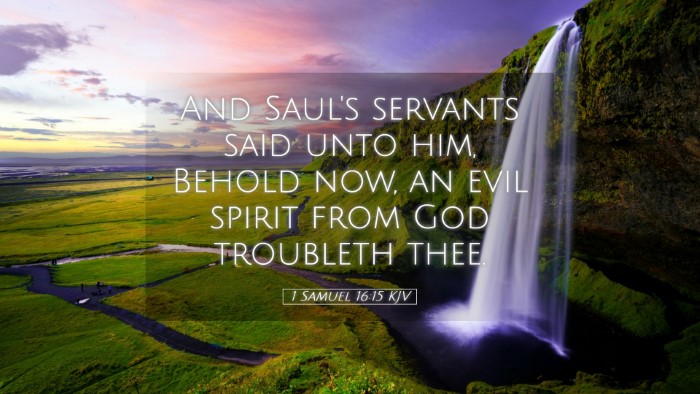Commentary on 1 Samuel 16:15
This verse is pivotal in the narrative of the anointing of David as king, showcasing the movements of God and the human heart in the context of divine selection and spiritual disturbance. Here we will explore this verse through insights from several public domain commentaries including those by Matthew Henry, Albert Barnes, and Adam Clarke.
Contextual Overview
1 Samuel 16:15 falls within the larger context of God's rejection of Saul as king and his choice of David. Saul, having turned away from God's commands, is contrasted with David, who is described as a man after God's own heart.
Verse Analysis
1 Samuel 16:15 (KJV): "And Saul's servants said unto him, Behold now, an evil spirit from God troubleth thee."
Matthew Henry's Insight
Matthew Henry notes that the term "evil spirit" suggests a state of spiritual decline in Saul. He emphasizes that this "evil spirit" was allowed by God as a form of judgment for Saul's disobedience. Henry states that God's hand often operates through spiritual means, and here, Saul's deterioration is directly linked to his rejection of God's will.
Albert Barnes' Contribution
Albert Barnes, in his commentary, highlights the theological implications of the phrase "from God." This notion indicates that God orchestrates events for His purposes, even allowing adverse forces to influence individuals who turn away from Him. Barnes argues that this should serve as a warning against disobedience, illustrating the consequences faced by Saul and the impending rise of David.
Adam Clarke's Explanation
Adam Clarke elaborates on the condition of Saul, commenting on how the "evil spirit" signifies not only psychological disturbances but also a spiritual void created by his rebellion. Clarke stresses the prophetic nature of the entire episode as foreshadowing a shift in divine favor from Saul to David. He speaks to the importance of spiritual integrity and the ramifications of neglecting God’s commands.
The Nature of the Evil Spirit
The presence of the "evil spirit" raises significant theological questions about God's sovereignty and the nature of evil. The commentary suggests that this evil spirit is not inherently malevolent but serves a divine purpose in bringing Saul to a realization of his fate.
- God's Sovereignty: The verse illustrates God’s ultimate authority over spiritual realms and His ability to use even an evil spirit for a divine purpose.
- Consequences of Disobedience: Saul’s experience underscores the reality of spiritual consequences that follow disobedience, encapsulating the idea that straying from God's path invites turmoil.
- Judgment as Correction: The evil spirit can be viewed as a tool for God’s judgment, designed to prompt Saul toward repentance, even in his ongoing rejection of divine guidance.
Implications for Leadership
This verse provides significant lessons for those in leadership roles within the church and society. It demonstrates the critical nature of remaining faithful to God's commands and the potential dangers of pride and self-reliance.
- Faithfulness to God: Leaders must prioritize their relationship with God, understanding that their decisions impact not only themselves but those they lead.
- Humility and Repentance: A posture of humility and readiness to repent will guard against the pride that can lead to spiritual decline.
- Awareness of Spiritual Forces: Leaders should be conscious of the spiritual battles that can manifest in their lives and ministries, emphasizing the necessity of prayer and spiritual warfare.
Conclusion
The commentary on 1 Samuel 16:15 offers profound insights into the workings of God's providence, the reality of spiritual influences, and the necessity of faithfulness in leadership. As this passage reveals the contrast between Saul and David, it also serves as a timeless reminder of God's sovereign choice and the importance of aligning one’s heart with His will.
Through the reflections of Matthew Henry, Albert Barnes, and Adam Clarke, we gain a deeper understanding of this scripture and its relevance to our lives today. It compels us to consider our own walks with God and our response to His guidance.


